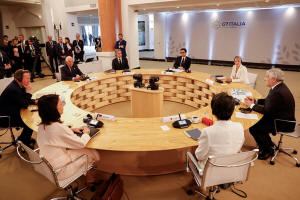G7 foreign ministers seek urgent defence support for Ukraine
 Send a link to a friend
Send a link to a friend
 [April 18, 2024]
By Crispian Balmer and Angelo Amante [April 18, 2024]
By Crispian Balmer and Angelo Amante
CAPRI, Italy (Reuters) - Foreign ministers from the Group of Seven (G7)
major powers warned on Thursday that Ukraine risked being defeated by
Russia unless it received more air defences, as Kyiv urged a change in
Western strategy towards the war.
More than two years into Russia's full-scale invasion, Ukraine is facing
a shortage of ammunition, with vital funding from the U.S. blocked by
Republicans in Congress for months and the EU failing to deliver
sufficient munitions on time.
G7 ministers kicked off a second day of talks on the Italian island of
Capri by discussing the Middle East crisis and will turn their attention
to Ukraine in the afternoon, when they will be joined by the head of
NATO and Ukraine's foreign minister.
The European Union foreign policy chief Josep Borrell, who attends G7
gatherings alongside U.S., Italian, German, French, British, Japanese
and Canadian counterparts, urged EU nations to hand over air defence
systems to help Ukraine protect its cities from Russia, which is
targeting key infrastructure.
"Otherwise the electricity system of Ukraine will be destroyed. And no
country can fight without having electricity at home, in the factories,
online, for everything," he told reporters as Thursday's session got
underway.
Ukrainian Foreign Minister Dmytro Kuleba said the West had a different
attitude towards Israel than his own country, noting that when Iran
launched missiles and drones towards Israel on Saturday, U.S., British
and French forces helped down them.

"The strategy of our partners in Israel seems to be in preventing damage
and death. ... In the last months, the strategy of our partners in
Ukraine seems to be in helping (us) to recover from damage," he said
ahead of the Capri talks.
"So our job today is to find a way where our partners will design a
mechanism, a way that will allow us also to avoid death and destruction
in Ukraine."
HOPE FROM WASHINGTON
Domestic political wrangling has delayed the delivery of desperately
needed aid for Ukraine worth $60.84 billion, but the U.S. House of
Representatives might finally get to vote on the package this weekend,
bringing some hope to G7 ministers.
[to top of second column]
|

British Foreign Secretary David Cameron, European Union foreign
policy chief Josep Borrell, U.S. Secretary of State Antony Blinken,
German Foreign Minister Annalena Baerbock, Japanese Foreign Minister
Yoko Kamikawa, Canadian Minister of Foreign Affairs Melanie Joly,
French Foreign Minister Stephane Sejourne and Italian Foreign
Minister Antonio Tajani meet on the second day of a G7 foreign
ministers meeting on Capri island, Italy, April 18, 2024.
REUTERS/Remo Casilli/Pool

"In these turbulent times, it is a hopeful sign that there are now
signals from the Republicans in the U.S. that support for Ukraine
can be continued intensively," German Foreign Minister Annalena
Baerbock told a news conference in Capri.
Kuleba said he hoped to get immediate pledges this week on the
delivery of more Patriot and SAMP/T air defence systems and also new
Western sanctions targeting Iran's production of armed drones, which
are being exported to Russia.
Opening Thursday's talks, Italian Foreign Minister Antonio Tajani
said the question of sanctions on Iran would be addressed as the
West looked for ways to penalise Tehran for its missile attack on
Israel, but also reiterated Western calls for Israel to show
restraint.
"Any form of retaliation would compromise already fragile and
delicate equilibriums," Tajani said.
It appears that such appeals will fall on deaf ears with Israel
saying on Wednesday it would make its own decisions about how to
defend itself, and British Foreign Secretary David Cameron saying it
was apparent Israel planned to strike back.
Although the Middle East and Ukraine will dominate the G7 gathering,
which finishes on Friday, the ministers will also look at ways of
strengthening ties with Africa, discuss stability in the
Indo-Pacific region and hold debates on issues including
cybersecurity and Artificial Intelligence.
(Additional reporting by Miranda Murray in Berlin; Editing by Toby
Chopra)
[© 2024 Thomson Reuters. All rights reserved.]This material
may not be published, broadcast, rewritten or redistributed.
Thompson Reuters is solely responsible for this content.
 |